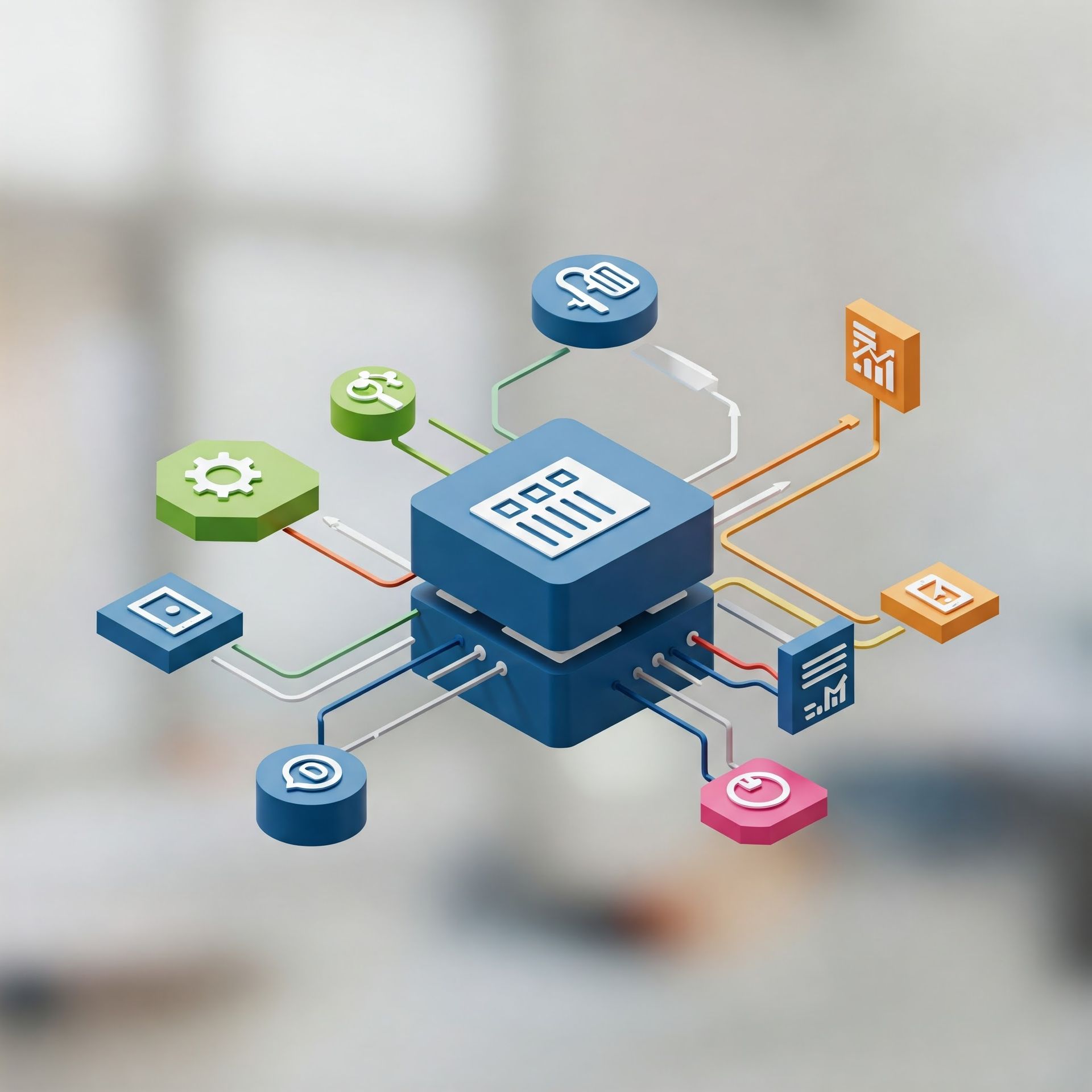Accountants, Raise Your Glasses! Smart View Has Landed in Google Workspace!
Nadia Lodroman • 10 April 2025
Listen to Tresora and Ledgeron's chatting about this blog post:
Smart View Goes Google: Liberation for Finance Teams!
As a recovering accountant, I know the comforting embrace of an Excel spreadsheet all too well. It's been the steadfast companion for countless analyses and reports. Even with the shiny new Oracle EPM cloud applications, the allure of Smart View, with its instant data insights, has kept many of us firmly rooted in that familiar grid.
But let's face it, this reliance came at a cost: a seemingly unbreakable chain to Microsoft Office subscriptions. For large corporations striving for enhanced security and seamless collaboration with Google Workspace, this dependency has been a persistent roadblock. For years, finance teams were often the last bastion of the "plasticky PC," clinging to Windows while the rest of the organization embraced the sleek security of Apple Macbooks and the collaborative power of Google Workspace.
And yes, I hear you – Smart View was technically accessible on macOS via the browser. But let's be real, that still meant shelling out for an Office 365 license on top of your Google Workspace subscription, just for that crucial EPM connectivity. It felt like being offered a key to a new, beautiful house, only to find out you still needed a separate, expensive key just to open one essential room.
This reliance on Smart View has come with a significant caveat: a continued dependence on Microsoft Office subscriptions. For large corporations, this has often been a frustrating obstacle, hindering the strategic move towards the more secure and collaborative ecosystem of Google Workspace. The dream of seamlessly integrating powerful EPM data with the flexibility and accessibility of Google's suite has felt just out of reach.
Well, my fellow finance aficionados, the wait is OVER! The barriers have been broken!
Your beloved Oracle Smart View has finally, gloriously, arrived in Google Workspace!
Imagine the possibilities:
- Need to dissect those budget variances? Open Google Sheets and dive straight into your Oracle EPM data with the familiar power of Smart View, no more clunky exports or platform switching.
- Crafting your monthly management pack? Picture the collaborative synergy of Google Slides, now seamlessly infused with real-time EPM insights via Smart View. Dynamic presentations, built together, in a secure environment.
- Tired of the hardware divide? Finally, finance professionals can fully embrace the organization's move to secure and stylish Apple Macbooks, leveraging Smart View directly within their Google Workspace environment.
Supported data source providers:
Oracle Smart View for Google Workspace currently supports Oracle Fusion Cloud Enterprise Performance Management data source providers. The following business processes of Cloud EPM are supported:
- Enterprise Profitability and Cost Management
- Financial Consolidation and Close
- FreeForm
- Planning
- Tax Reporting
How to get started:
To use Smart View in Google Sheets, users need to install the Smart View add-on extension from Google Workspace Marketplace.
A few important considerations:
- Performance may vary due to additional processing on Google's servers.
- The user interface is currently only available in English.
- Oracle recommends using Standard mode for the Smart View Ad Hoc Behavior setting.
Liberation Day was March 25th, 2025.
We might have missed the initial parade, but the sentiment remains strong. It's time for a belated celebration! Crack open the virtual (or real!) champagne and toast to a future where finance teams can operate with the full power of Oracle EPM within the secure and collaborative embrace of Google Workspace, finally leaving behind the constraints of Microsoft Office and those outdated "plasticky PCs."
The future is here, it's integrated, and it's gloriously free!

Are you tired of wrestling with data scattered across your Oracle landscape? Do you spend countless hours manually compiling reports from your EPM Cloud, ERP Cloud, and other systems? The struggle is real. Extracting consistent, accurate, and timely insights from disparate sources can feel like navigating a maze. But what if there was a way to centralise your reporting, automate updates, and empower your business users? Enter Narrative Reporting , a powerful solution designed to streamline the creation and distribution of a wide array of reports, from crucial financial statements to insightful management dashboards and formal board books. Narrative Reporting acts as your central hub, connecting seamlessly to your various Oracle data sources and providing a collaborative environment for report authoring and review. However, simply implementing a new tool isn't enough. To truly unlock the transformative potential of Narrative Reporting, you need a guide – someone who understands your business inside and out and can translate those needs into a robust reporting framework. This is where the functional consultant, armed with their deep business expertise, becomes indispensable. The Power of Centralised Reporting with Narrative Reporting Imagine a world where generating your monthly financial close, preparing a quarterly board report, or analysing sales performance doesn't involve endless data exports and manual manipulation. Narrative Reporting makes this a reality by providing a unified platform for all your reporting needs. Connect once to your Oracle EPM Cloud (Planning, FCCS, PCMCS), Oracle ERP Cloud (Financials, SCM), and other relevant systems, and then leverage a centralised environment to design, create, and distribute reports. This unified approach brings a wealth of benefits: Consistency: Ensure that all your reports adhere to the same formatting and data definitions, eliminating discrepancies and improving trust in the numbers. Accuracy: By directly connecting to your source systems, you minimize the risk of manual data entry errors. Reduced Redundancy: Say goodbye to creating the same data extracts and calculations repeatedly for different reports. Improved Efficiency: Automate data refreshes and streamline the entire reporting lifecycle, freeing up valuable time for analysis and strategic thinking. Substitution Variables: Your Functional Consultant's Secret Weapon Within Narrative Reporting's arsenal of powerful features, substitution variables stand out as a key to unlocking flexibility and efficiency. Think of them as dynamic placeholders within your reports that can be easily changed to alter the data being displayed. This simple yet powerful concept allows business users to generate various report views without needing to modify the underlying report design. Let's look at some practical examples: Want to see last month's financial performance? Simply change the Period substitution variable (e.g., &CurrentPeriod.) from "Dec-24" to "Mar-25," and all relevant reports will automatically update. Need a sales report specifically for your European division? By adjusting the Entity substitution variable (e.g., &Entity.) to "EMEA Sales," the report will filter accordingly. Comparing your actual results against the annual budget? Just toggle the Scenario substitution variable (e.g., &Scenario.) between "Actual" and "Budget." The beauty of substitution variables lies in their business relevance. And who is best positioned to understand and define these crucial variables? You guessed it – the functional consultant. Their intimate knowledge of your organization's structure, reporting hierarchies, key performance indicators, and business cycles makes them the ideal candidate to identify and implement meaningful substitution variables that empower business users. The Functional Consultant: Bridging the Gap Between Business and Technology A functional consultant isn't just a technical expert; they are a business partner who understands your operational nuances and reporting pain points. Their role in a successful Narrative Reporting implementation goes far beyond simply installing the software. They act as the vital link between your business needs and the technological capabilities of Narrative Reporting. Here's how: Understanding Your Business Requirements: They delve deep into your reporting processes, asking the right questions to understand what information you need, who needs it, and how frequently. This understanding forms the foundation for designing an effective reporting structure. Designing the Reporting Structure: Leveraging their knowledge of your organisational hierarchy and reporting flows, they can architect a logical and efficient reporting framework within Narrative Reporting, ensuring that reports are easy to navigate and understand. Defining and Implementing Substitution Variables: As we've emphasised, their business acumen allows them to identify the most relevant dimensions (like period, entity, scenario, currency) that should be dynamic through substitution variables, making reporting more flexible and user-friendly. Ensuring Data Integrity and Consistency: With their understanding of the underlying Oracle data models, they can help map data accurately into Narrative Reporting, ensuring that the information presented is reliable and consistent across all reports. Empowering Users Through Training: Functional consultants can provide tailored training to your business users, clearly explaining how to leverage substitution variables and other Narrative Reporting features to generate the reports they need, when they need them. This fosters self-service and reduces the reliance on IT for routine reporting tasks. Facilitating Collaboration with IT: They serve as a crucial bridge between the business and IT teams, ensuring that the technical implementation aligns perfectly with the defined business requirements. Benefits of Leveraging Narrative Reporting and Functional Expertise The synergy between Narrative Reporting's powerful capabilities and the strategic guidance of a functional consultant delivers significant benefits: Significant Time Savings: Automating report updates through well-defined substitution variables drastically reduces manual effort and frees up valuable time for analysis. Improved Report Accuracy: Centralizing data sources and standardizing report formats minimizes the risk of errors and inconsistencies. Enhanced Reporting Flexibility: Business users gain the ability to tailor reports to their specific needs using substitution variables, without requiring technical expertise or involving IT for every minor change. Better Collaboration and Governance: Narrative Reporting's collaborative workflows, coupled with a clear reporting structure defined by functional consultants, improve teamwork and ensure proper report governance. Data-Driven Decision Making: Timely, accurate, and easily adaptable reports empower business users with the insights they need to make informed decisions and drive better business outcomes. Conclusion Narrative Reporting offers a compelling solution for organizations struggling with fragmented Oracle reporting processes. However, to truly unlock its potential and transform your reporting landscape, the expertise of a functional consultant is paramount. Their business acumen, combined with the power of features like substitution variables, creates a dynamic and efficient reporting environment that empowers your business users and provides timely, accurate insights. Don't let your valuable Oracle data remain trapped in silos. Embrace Narrative Reporting and partner with a functional consultant to streamline your reporting and unleash the true power of your information. Ready to transform your Oracle reporting? Contact us today to learn how our functional consultants can help you implement and adopt Narrative Reporting!

Oracle Tax Reporting is a powerful tool that can help streamline and enhance the accuracy of the Return to Accrual (RTA) process. The Return to Accrual process is a critical step in the tax provision process, and Oracle Tax Reporting provides automation features and data reconciliation capabilities to help manage its complexities.




